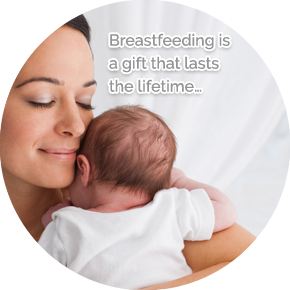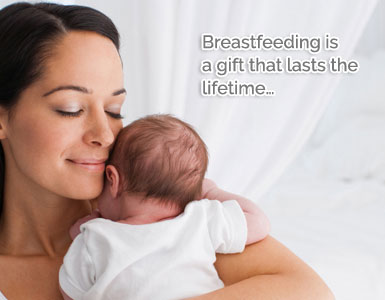Benefits of Breastfeeding to the mother
 A woman grows physically as well as emotionally from the relationship she forms with her baby.
A woman grows physically as well as emotionally from the relationship she forms with her baby.
Just as a woman's breast milk is designed specifically to nourish her baby, the production and delivery of this milk aids her own health also.
It is fresh, perfectly clean, just the right temperature, and the healthiest choice at the least cost. Besides this, it offers numerous benefits to the mothers such as:
Helps in Bonding with the baby
Beneficial hormones are released into the mother's body during breastfeeding which strengthens the maternal bond. Researchers have found that the bond of a nursing mother and her baby is stronger than any other human contact. Holding your child to your breast provides you with psychological experience that is even more powerful than carrying the fetus inside her uterus.
The emotional health of the mother is likely to be enhanced during breastfeeding, resulting in a stronger sense of connection with her baby and fewer feelings of anxiety.
Supporting a mother, while breastfeeding, assists in familial bonds and even helps build a father-baby bond.
Hormone Release
Breastfeeding releases two important hormones -oxytocin and prolactin. These hormones relax the mother and make her feel more nurturing toward her baby.
Weight Loss
Breastfeeding reduces risk of long-term obesity and hypertension. In fact, mothers who breastfeed have a greater chance of returning to their pre-pregnancy weight than mothers who formula feed.
Woman burn many calories during lactation as their body produces milk .Some of the weight gained during pregnancy serves as an energy source for lactation.
Long-term Health Effects
The long-term health benefits of breastfeeding for nursing mothers are vast and include protection against a wide array of life-threatening diseases such as:
- Research shows that nursing for six months or more reduces the risk of reproductive cancers. Prolonged nursing is believed to lower a woman's lifetime risk of ovarian and endometrial cancer, because it suppresses the ovulatory hormones that play a role in these cancers—during those first few months that she nurses exclusively.
- Women who lactate for two or more years reduce their chances of developing breast cancer by 24 per cent. Parity and duration of breast feeding also have a strong influence on the risk of breast cancer. Compared with parous women who breast fed les often, women who had breast fed for 25 months or more had a lower relative risk.
- Women who breastfed often witnessed a protective effect against uterine cancer. This protection increases with breastfeeding duration. Breastfeeding decreases ovulatory age, thereby decreasing the risk of ovarian cancer. Breastfeeding also decreases the risk for and incidence of thyroid cancer.
Reproductive cancers
- In 2009, researchers found that women who nursed for about 24 months, over the course of their reproductive lifespan, had a lower risk of developing coronary heart disease.
Heart disease
- Numerous studies have linked breastfeeding to protection against rheumatoid arthritis. One from Harvard's Brigham and Women's Hospital found that nursing for a total of 2 years decreased the risk by 50 per cent, while nursing for 12-23 months lowered risk by 20 per cent. Breastfeeding seems to alter levels of female sex hormones -estrogen and certain androgens, thought to play a role in this condition.
Rheumatoid arthritis
- Breastfeeding also protects nursing mothers against type-2 diabetes. This is because lactation makes cells more sensitive to the hormone insulin. In fact, diabetic mothers who breast-feed regularly require less insulin when they breastfeed. Excessive abdominal fat acquired during pregnancy is one of the key risk factors in adult diabetes. In fact, women who suffer from gestational diabetes have a lower risk of developing type-2 diabetes later on.
Diabetes
Emotional Health
Breastfeeding produces soothing hormones oxytocin and prolactin that not only promotes stress reduction but also generates positive feelings in the nursing mother.
At one month postpartum, women who breast fed their infants had scores indicating lower anxiety and more mutuality than women who bottle-fed their babies. Some research suggest that woman who nurse their babies have fewer episodes of postnatal depression.
With time, breastfeeding mothers learn to read and understand their baby's cues and babies learn to trust caregivers. This helps in shaping the baby's early behavior.

